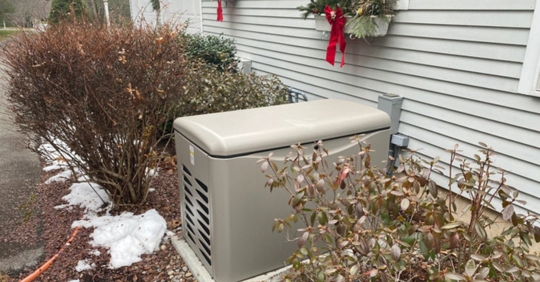As the holidays draw near, homes all over Northern Virginia light up with festive cheer. But with all those twinkling lights, warm gatherings, and busy kitchens, your home’s power demand surges—right along with everyone else’s. This extra load can strain the electrical grid and lead to untimely power outages that interrupt your celebrations and comfort.
Winter weather doesn’t help either. Heavy snow, ice, and strong winds can easily knock down power lines and leave neighborhoods in the dark for hours—or even days. Preparing for these possibilities ensures your home stays safe, warm, and full of holiday spirit, no matter what the weather brings.
Why Power Outages Are More Than Just an Inconvenience
When the power goes out, it’s more than missing your favorite holiday movie. Without electricity:
- Food spoils quickly, especially with refrigerators and freezers offline.
- Pipes can freeze and burst, leading to expensive water damage.
- Security systems shut down, leaving your home vulnerable.
- Communication lines may fail, making it harder to call for help.
A home generator can eliminate these worries. It provides a reliable backup power source that keeps your essential systems running—and your family comfortable and safe.
Choosing the Right Generator for Your Home
There’s no one-size-fits-all when it comes to generators. Here’s a quick breakdown of your options:
- Standby Generators: Permanently installed and automatically turn on during outages. Great for whole-home coverage.
- Portable Generators: More affordable and mobile but need manual setup and refueling.
- Inverter Generators: Energy-efficient and quiet—ideal for smaller homes or select appliances.
You’ll also want to consider fuel type:
- Natural Gas: Convenient if your home already has a gas line.
- Diesel: Long-lasting and efficient but higher upfront cost.
- Gasoline: Readily available but less efficient for long-term use.
- Solar: Eco-friendly but less reliable during cloudy winter days.
A Fayette Electrical Service technician can help you determine which setup best fits your household’s needs and budget.
How Home Generators Work
Generators convert mechanical energy into electricity, supplying power directly to your home’s circuits through a transfer switch. This device safely disconnects your home from the utility grid to prevent backfeeding—protecting both your home and local utility workers.
Professional installation is crucial to ensure the system is properly connected, balanced, and ready to handle your home’s electrical load during an outage.
Comfort and Safety When It Matters Most
Having a backup generator means your home stays warm, well-lit, and secure even when the power’s out. You can continue cooking, keep your heating system running, and ensure family members who rely on medical devices have the power they need.
During long winter nights, continuous lighting also adds an important layer of safety and reassurance. A generator lets you relax and focus on what matters most—celebrating with family and friends.
The Financial Benefits of Installing a Generator
While generators are an investment, they can save you money in the long run:
- Prevent food waste by keeping refrigerators and freezers powered.
- Avoid costly repairs from burst pipes and water damage.
- Protect valuable electronics from power surges when electricity returns.
Plus, standby generators often start automatically, ensuring minimal disruption—no fumbling in the dark or worrying about spoiled food. That convenience alone is worth the peace of mind.
Determining Your Power Needs
Before choosing a generator, assess how much power your household truly needs. Think about which systems you can’t live without during an outage—heating, lights, refrigerator, sump pump, or medical equipment.
A professional energy assessment from Fayette Electrical Service can help calculate the right generator size for your lifestyle, preventing underpowered or overbuilt installations.
Professional Installation and Maintenance
Installing a generator isn’t a DIY project. It requires proper site placement, ventilation, permitting, and safety compliance. Fayette Electrical Service handles the entire process from start to finish, ensuring your generator is installed safely and ready when you need it most.
Once installed, routine maintenance is key to keeping it reliable. This includes:
- Monthly system checks
- Annual oil and filter changes
- Running the unit periodically to prevent engine seizing
- Cleaning and debris removal
Staying proactive ensures your generator runs smoothly—especially when winter storms strike.
Generator Safety 101
Safety should always come first:
- Never operate a generator indoors or in enclosed spaces.
- Store fuel safely and use stabilizers to prevent degradation.
- Install carbon monoxide detectors to protect your family.
- Familiarize yourself with emergency procedures and proper shutdown steps.
These precautions ensure your generator keeps your family safe—not at risk.
If You Need a Generator, You Need Fayette Electrical Service
Whether considering installation, conducting regular maintenance, or seeking professional advice, ensuring your home has a power supply is essential for staying comfortable and safe during the holiday season. If you're looking for expert guidance on selecting or installing a generator, the Fayette Electrical Service team is equipped to provide the support you need. Don't wait for the cold to strike—contact us today to secure your home's power future and ensure a joyful, uninterrupted holiday season.
Call Fayette Electrical Service now at (859) 695-2259 or send us a message online.

